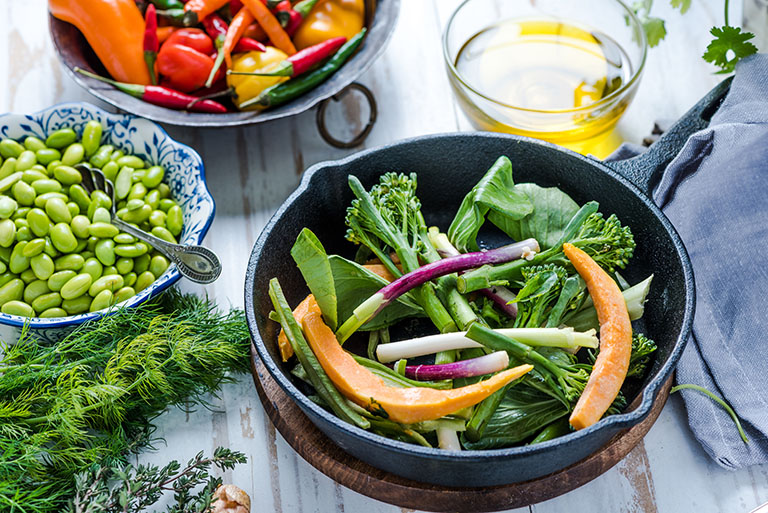
You may have noticed that “clean eating” is among the more prominent buzz phrases still being used in the nutrition, beauty, and fashion industry these days. Well-known actors, fashion models, and the like, are utilizing this nutritional and beneficial way of eating to ensure they look and feel their best. It has caught the attention of people from all walks of life that want to better themselves and feel good about what they eat on a daily basis.
If you’re not familiar with clean eating, you may be wondering, “Why should I eat clean when dirty (traditional eating) seems just fine?” That’s a great question and worth looking into. Let’s dive in and take a closer look at clean eating and why it’s a good idea to incorporate it into your daily meals.
What Exactly is Clean Eating?
Simply put, clean eating is consuming food the way nature intended you to. This means avoiding processed foods and leaning towards foods that are in their natural state, or as close as possible to it. For example, instead of eating a blueberry almond muffin for your mid-morning snack, you would instead have a side of blueberries and almonds. Or, to break it down even further, avoid buying a bag of pre-chopped walnuts that have gone through a chopping facility, and instead go for the walnuts that are still in their shell waiting to be opened. This way, you are avoiding the “processed” aspect and going straight for the nutrient-packed whole elements. Now that you have a general understanding of clean eating, let’s break it down a bit.
The Steps Your Food Goes Through can Determine its Cleanness

When considering foods to add to a clean daily meal plan, think about how the food was produced, or what path it took to get to your local grocery store. The more steps, the less clean. A bag of pre-cut carrots that started out on a farm, are then placed on a truck and driven to a manufacturing plant, ran through a cutting and sorting facility, and then bagged and thrown back on a truck. By the time these carrots are within your reach, they have lost many nutrients along the way. Your best bet would be to obtain your food from your local farmer’s market, which would most likely be directly from the farm.
With that being said, think about how many more nutrients are lost in foods that are heavily processed such a frozen meal that has gone through a cooking and freezing process in a large facility. This type of meal contains many additives and preservatives that taint the food you feed your body. This also applies to food that is prepared at home, the more steps you put your food through; the further it will be from its natural healthy state. So what it boils down to is that clean eating emphasizes whole, unprocessed or minimally processed, healthy food that has not had anything added to it, along with nothing being taken away. This leaves you with nutrient-rich foods that will greatly benefit your health.
Clean Eating Quick Tips:
• Strive to eat foods in their natural state
• Eliminate or dramatically cut-down on processed foods
• Choose organic foods to avoid pesticides
• Consume unrefined whole grains such as brown rice not white
• Replace white sugar with a clean alternative such as honey
• Meats should be free-range and grass-fed – no hormones or antibiotics
• Add clean proteins, healthy fats, and carbohydrates for a well-rounded diet
Is Cooked Food Considered Clean
Yes, it is! Eating your food in its unaltered, uncooked state would be best, but lightly cooking your meals is perfectly fine also. Although cooking does alter your food and some nutrients are lost, it is also true that other nutrients are actually elevated during the cooking process. A study conducted by the Journal of Agriculture and Food Chemistry concluded that cooked tomatoes have a 35% increased level of lycopene. This nutrient fights off skin-damaging free radicals. So as you can see, minimally cooked food is actually beneficial in some cases. Furthermore, some food requires cooking, such as meats or rice.
Clean Eating – Sample Meal Plan

To give you an even better idea of clean eating, we thought it would be helpful to provide an example of a typical clean meal plan. Meal plans like this can give you more energy, keep you healthy and looking your best, as well as give you a piece of mind knowing you are taking care of yourself.
Breakfast
• No-cook overnight oatmeal with fresh blueberries
• Small glass of fresh-squeezed orange juice
Lunch
• Southwestern quinoa salad with black beans and farm stand veggies
Dinner
• Grilled wild salmon with mango-kiwi relish
• Lightly steamed green beans with lemon
• Garlic herbed brown rice with parsley
The Average American Diet – A Comparison
Now that you have a better understanding of what clean eating entails, let’s take a step back and evaluate the average American diet. Since people cook a variety of foods in their homes, a fair way to examine an unclean diet would be to layout a typical American restaurant meal since everyone is offered the same choices. Most people love to eat out because it’s convenient and there are no meal preparation or dishes to clean. Unfortunately, if you are not putting effort into your meals, it can sometimes translates into not enough effort being directed towards your health.
Typical Restaurant Lunch
• Gourmet BBQ burger with apple smoked bacon
• White sesame seed bun
• Seasoned french fries
• Large soda with free refills
As you can see, this meal is filled with heavily processed unhealthy foods that are lacking in nutrients. It’s loaded with carbohydrates, sugars, trans fats, sodium, has little or no fiber, and mostly consists of empty calories. This type of consumption, on a regular basis, can damage your health and give you an unhealthy poor appearance. It can lead to heart disease, cancer, and a variety of illnesses. In contrast, a clean eating lifestyle can have the opposite effect which will significantly improve your health.
Getting Specific – Cosmetic Benefits of Eating Clean
They say you are what you eat, and they are correct. If you are eating a typical unclean diet then your appearance will reflect that. Eating clean healthy foods that retain their maximum nutrient levels will have your body thanking you. Our bodies were meant to take in whole nutrient-packed foods that nourish our every cell. When we don’t receive it, the effects can start to show up in multiple ways, such as our appearance. This is when you realize that beauty comes from within and everything you place into your body will affect how you look and feel. It can be the difference between looking young and vibrant to older than your age and rundown.
How Big is the Link Between Nutritional Intake and Your Appearance
Cosmetically speaking, your nutritional intake plays a huge role in how you look as well as how you age. An eating clean nutrient-packed meal plan can keep your skin tighter and blemish free, your eyes whiter, bones stronger, teeth and gums healthier, hair softer, and your weight down. In an abstract presented by Dermato Endocrinology, it was shown that there is a proven link between nutrition and skin aging. It makes sense, your body needs certain nutrients to stay on top of its game, if it is deprived, your outward appearance will suffer.
What Should be Avoided to Eliminate Cosmetic Concerns
It goes without saying that to maximize your cosmetic and physical wellbeing you would need to minimize your unclean eating habits. Avoid as much as possible, refined foods such as white flour, foods high in saturated fats, pesticides, sodium, empty calories, sugars, carbohydrates, preservatives, hormones, facility processed fruits and vegetables, and processed foods in general. If consuming these elements regularly, your body will most likely let you know it does not like what you are feeding it by a decline in health and appearance. When eliminating these foods from your diet, you can easily replace them with delicious, healthy, unprocessed foods that will have you looking and feeling your best.
Clean eating is not the latest fad that will be replaced with the next one, it has been around for years, and for good reason. People around the world have incorporated this way of eating into their daily meals, and it is more of a lifestyle rather than a diet. We hope the information provided in this article has given you a clear insight into why eating clean is important to your health and your wellbeing.